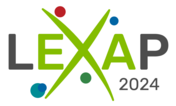Speaker
Description
Experimental Investigation of QED Effects through Antiprotonic Atom X-ray spectroscopy: first test beams with TES detectors and solid targets
Senetaire Quentin, Paul Nancy, Baptista Gonçalo and Indelicato Paul
Laboratoire Kastler Brossel, Sorbonne Université, CNRS, ENS-PSL Research University, Collège de France, Case 74; 4, place Jussieu, F-75005 Paris, France
quentin.senetaire@lkb.upmc.fr
Tests of our understanding of strong field quantum electrodynamics (QED) represent a key frontier in fundamental physics pursued by precision measurements. A new experiment called PAX (antiProtonic Atom X-ray spectroscopy), seeks to probe higher-order strong-field QED through precision spectroscopy of Rydberg states in antiprotonic atoms. The PAX project is possible due to slow antiproton beams now available at ELENA, and new pixeled Transition-Edge Sensor (TES) x-ray microcalorimeter detectors. TES detectors boast a 50x gain in intrinsic resolution over semiconductor methods, however these very sensitive quantum sensors have yet to be demonstrated with antimatter beams. The first step of the PAX project is to perform an in-beam test of a TES detector at ELENA by sending bunched antiprotons onto solid targets and measuring the resulting x-ray cascade with a prototype TES.
I will present the detailed design of this test setup both for beamline infrastructure and detector design, as well as first results from the 2024 beamtime with the target chamber and Ge detector used for overview spectroscopy and diagnostics. The first results will be compared with a complete GEANT4 simulation, and I will discuss the prospects of the full test beam planned for 2025.

